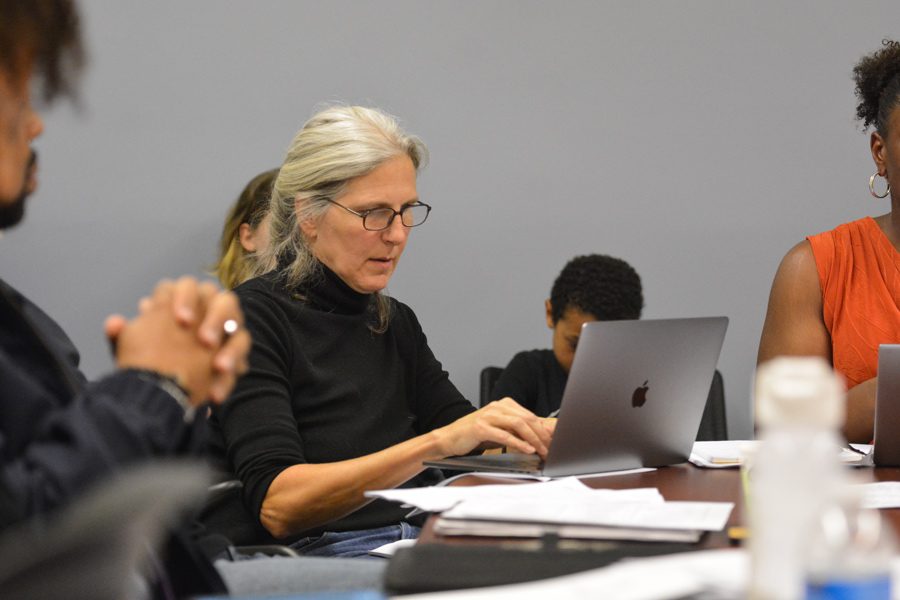Police assessment committee holds first meeting, plans to reform complaint process
Oreste Visentini/The Daily Northwestern
Committee member Karen Courtright speaks at the first Citizen Police Complaint Assessment Committee meeting on Thursday. The committee decided the police complaint form was inadequate.
October 13, 2017
At the first Citizen Police Complaint Assessment Committee meeting Thursday, many community members requested the improvement of what they called a “highly unstructured” police complaint form.
On the form, the complainant is expected to provide the date and time of the incident, the names and badge numbers of the officers involved and a full, detailed account of the interaction. The committee — created earlier this year to examine the Evanston Police Department’s complaint process — decided that in most cases, people are unable to recall that much detail.
“Situations like that make filling this (form) out incredibly complicated,” committee member Vincent Thomas, Jr. said. “I’m not analyzing facial features. I’m looking at their hands. I’m looking at their clipboard and I’m looking to see what gear the car is in.”
For example, Thomas said, he saw two policemen in an unmarked vehicle Thursday morning when walking on Maple Avenue. He said the officers, who wore black vests over their street clothes, were calling his name.
Thomas, who is black, said he turned his attention to the white, middle-aged officers, who then asked three or four times for his name and if he had a GPS monitor on him. After he confirmed his identity, Thomas said he noticed a mugshot of a young, black male in the officers’ vehicle.
Thomas said he believed the officers were driving down the street, calling the name “Vincent” out to black individuals who resembled the mugshot.
Because he is a maritime law enforcement specialist with the U.S. Coast Guard, Thomas said he was able to handle the situation calmly. However, he asked the committee to imagine what could have happened if another individual was in his place and had panicked.
Thomas added that he was unable to recall all the information requested by the form.
“Even though I have the background I have,” Thomas said, “I don’t feel confident that I could fill this (form) out with any detail … to the point that you could come to a conclusion.”
If someone were to file a complaint, Evanston police Sgt. Dennis Leaks said the Office of Professional Standards would begin an investigation by speaking with the individual and compiling evidence. Leaks said the complainant would be notified of the disposition, after which it would be presented at Citizen Police Advisory Committee and City Council Human Services Committee meetings.
After reviewing the evidence, the two committees would vote to determine if formal or informal action should be taken against an officer. Leaks said a formal investigation requires the complainant’s signature.
“If it is a formal investigation, that means (the officer) will get a minimum three days’ suspension,” Leaks said. “An informal investigation goes from oral reprimand to three days’ suspension.”
However, Leaks said filing a complaint — either via mail, over the phone or in person — takes 45 to 60 days. Community members at Thursday’s meeting were dissatisfied with the length of the process.
In response to the concerns raised at the meeting, committee members said they will meet monthly through spring 2018 to reform the system.
Committee member Karen Courtright said the committee is creating the “best practice” to heal the lack of trust that exists between police and citizens.
“My goal is to (make) positive improvements in the relationship between the Evanston Police Department and the black and brown communities,” Courtright said.
Email: [email protected]
Twitter: @nikkibaim22


